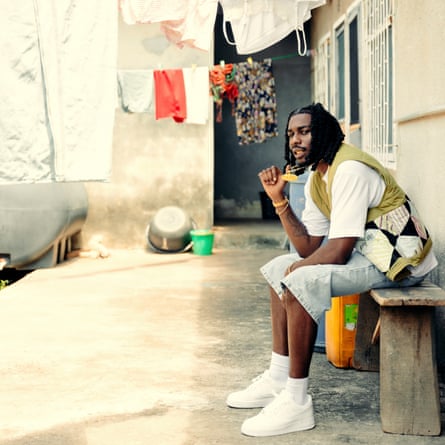When Knucks was 12, his parents made a monumental decision. The fledgling rapper had been getting into trouble at his school in London so, in a bid to rectify this, they packed him off to boarding school in Enugu in Nigeria. “Some people out there just didn’t understand me,” says Knucks, as we talk at his record label’s office. “Like, in Britain people are saying, ‘Go home.’ But people in Nigeria were like, ‘You don’t belong here either.’”
Boarding school proved to be a challenging couple of years for Knucks, whose real name is Afamefuna Ashley Nwachukwu. He swiftly picked up a handful of “nemeses”, including the most popular boy in the year, who threatened him on his first day and warned him to stay away from his girlfriend. Miles from the place he called home, and without amenities such as a washing machine, Knucks found solace in a friendship with the school cook. “She was my mother figure,” he says. “If I was sad or homesick, I would go to her.”
Tales from Knucks’s two years in Nigeria feed into his new album, A Fine African Man, which finds the 30-year-old reflecting on “where I stand in the world, what kind of person I am, how my values are influenced by things that happened back then”. On the song Cut Knuckles, he compares the luxuries of his current life (“Now I’m watchin’ the brand new stuff that I got gettin’ tumble dried”) with memories of having to handwash his clothes in Enugu (“No washing machine / Man wasn’t a teen / But was washin’ my clothes by hand / Cut knuckles, the water stang”).
Knucks has spent the past decade taking his narrative-driven, conscious lyricism to the very top of British rap. When his breakthrough single, 21 Candles, was released on SoundCloud in 2015, his musings on the impermanence of friendships marked him out as relatable and introspective, vulnerable even. You can hear those qualities again on new track Are You Okay?, which contemplates the limits of fame and money; and on Three Musketeers from his 2022 debut album Alpha Place, which is about his experience of survivor guilt, and on which he reflects on being the only one of his trio of closest friends to have escaped the daily battles and tensions of his Kilburn housing estate. Alpha Place racked up millions of streams and earned the Mobo award for album of the year, in a win shared with Little Simz (for her Sometimes I Might Be Introvert).
Knucks tells me it was during the summer before secondary school that he first got into making music with friends from his estate. When he got to secondary school there was a recording studio, so “during lunchbreaks, me and seven friends went and recorded eight-bar after eight-bar”. Grime was the obsession of the schoolyard before he was sent to Nigeria, but when he returned in 2008, “the temperature had changed”. Road rap was in: “Everyone was talking about Giggs. Talkin’ da Hardest had just come out.”

Knucks was using soul samples and “high-pitched female vocals”, rather than the electronic production of grime, and as he absorbed classic albums by Nas and MF Doom, his transition towards hip-hop continued. Nas’s Illmatic was particularly foundational to shaping his own music, even inspiring the name of Knucks’s first mixtape, Killmatic. “The rawness, the lyricism, the stories, how hungry Nas was: I saw a lot of that in myself.”
It wasn’t only the musical landscape that was changed when Knucks returned from Nigeria. In northwest London, he had been surrounded by diverse communities, but by the time of his return to the UK, his family had relocated to Watford in Hertfordshire, where he attended a “very white” school. Before, Knucks had been known as Afamefuna or Afam. Now he felt humiliated whenever his name was butchered in assemblies. When the headmaster suggested he go by his middle name, Ashley, he “jumped at it”.
Does he regret dropping his Nigerian name? Yes and no. It was an adaptation strategy, he says. Plus everyone just calls him Knucks now anyway (a shortening of his nickname “Knuckles”, which came from a playground game and his favourite Sonic character). Still, he also felt some shame about it, he says, something he documents on new track My Name Is My Name, and across the album in general. (A Fine African Man is, after all, an acrostic of Afam.)

Knucks has traversed drill, soul, jazz infusions and classic boom-bap hip-hop over his career – and now he’s tapping into West African cadences. Nigerian influences suffuse the album. When he visited in 2023, he stood at the bus stop by his old boarding school and recorded the conductors, eventually incorporating these field recordings into the tracks. On Masquerade there’s the use of an ogene, a cowbell-like instrument used during masquerades in Igboland, and the ojà flute, which you may recognise from Nigerian singer Kcee’s amapiano hit Ojapiano. “I’m making an effort to put these instruments in there so people from home can relate to it on a deeper level,” says Knucks.
With his parents having been strict enough to send him to boarding school in Nigeria, I wonder how they responded to his rap aspirations. Knucks says they were actually warm to the idea, but also insisted he go to university. (He graduated from UCA Rochester with a degree in animation and computer graphics). They also had confidence in his manager and mentor, Nathan “NRG” Rodney. Before he died in a car crash in 2018, Rodney had become one of the great influences in Knucks’s life, helping him course-correct whenever egotistic or selfish instincts took him in wayward directions. Knucks’s voice shakes when talking about NRG’s death: “It put me in a rut, because I had mad love for him. He was like an older brother.”
You can sense Rodney’s guidance in A Fine African Man’s blossoming maturity. Four years ago, when Knucks’s father was transferring money to friends and relatives in Nigeria, the rapper asked if he could add some for someone else he considered family: the cook who had looked after him at boarding school. She had become bedbound and unable to work, and when the money reached her she was apparently moved to find she had made such an impression on Knucks. Her story is retold on the album’s track Yam Porridge, which includes intimate memories of her own late father.
“I made the effort to tell the story from her perspective,” says Knucks, “and to leave myself out until the end.”
A Fine African Man is released on 31 October on NoDaysOff







